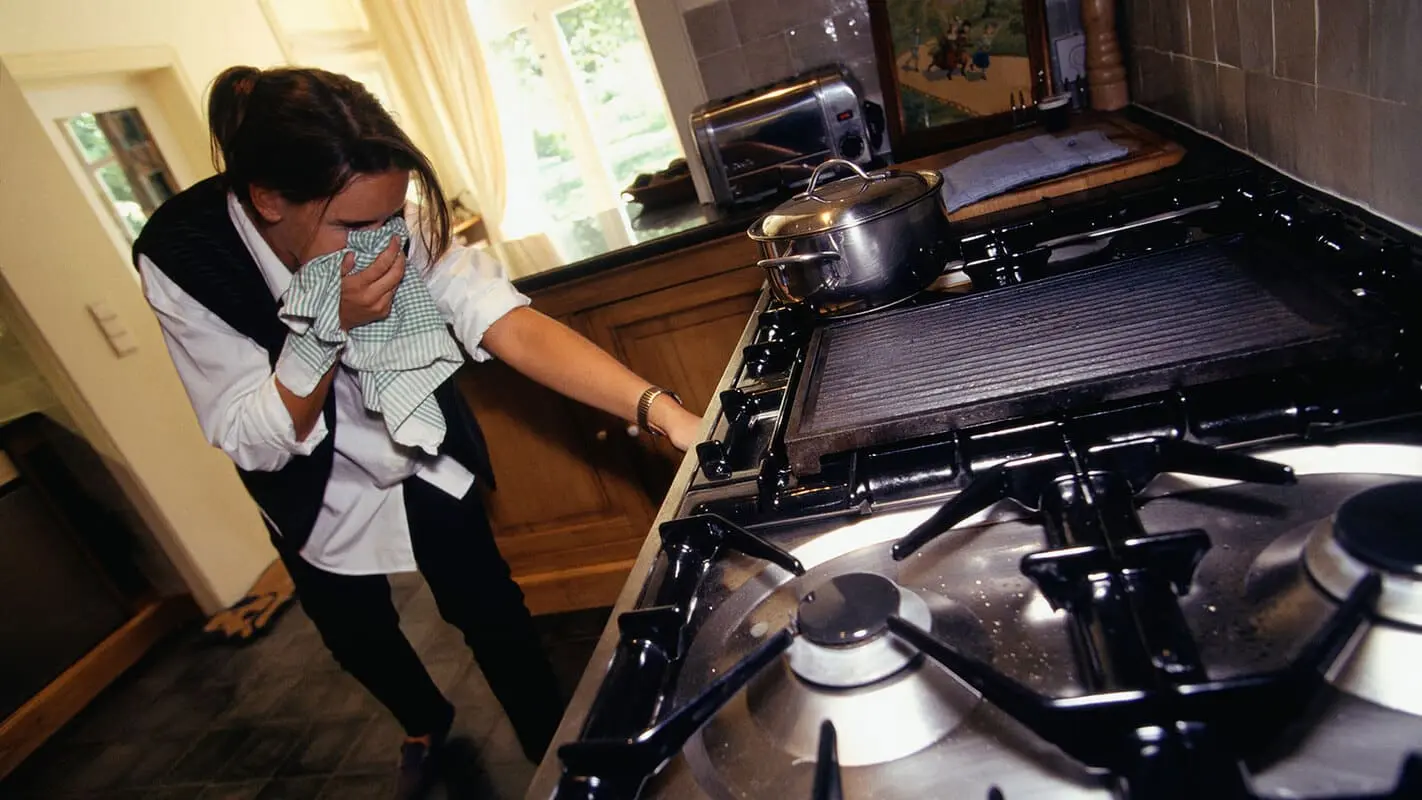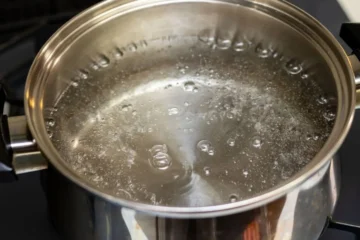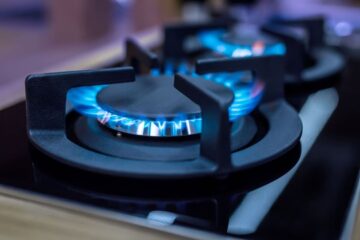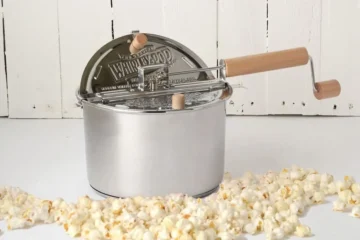Gas leaks from your stove, also known as ventless gas stoves, are always alarming because they can cause significant fires and explosions. But before you panic, try to identify the source of the gas leak and solve it in time!
Otherwise, call your local fire department and report the leak right away! The following 5 reasons and solutions will help you deal with this problem like a pro.
Why Gas Leak On Stove? Reasons
If you have a gas leak on your stove, it could be caused by any of these five issues.
1. Problematic Burners
Problematic burners are the most common cause of gas leaks. The burner is the only source of combustion air in the stove, and it can be a problem if it’s dirty or clogged with carbon build-up. A clogged burner will also burn fuel inefficiently.
A dirty burner may be caused by condensation inside the stove’s metal case. This can cause flames to back up into the canister orifice, which causes an increase in pressure inside your stove and a loss of efficiency.
A clogged burner may be caused by dirt or debris that settles in between the burner body and its housing. This debris will reduce airflow to your stove, which increases pressure inside your stove and leads to a loss of efficiency.
2. Pilot Light
The pilot light can be a source of the gas leak. The pilot light ignites the gas, and it creates a flame. If you have no pilot light, then your stove will not work. You have to replace the pilot light if you have a gas stove.
3. Oven Igniter
There are many reasons why your stove may be leaking gas. The most common is that the igniter is bad. This can happen if the igniter is damaged or needs to be replaced. To fix this issue, you will need to replace your stove’s igniter and replace it with a new one.
4. Hose Leak
It may be time to check your hose if you have a gas stove. A leaky hose can cause a lot of damage in your home, including:
– A carbon monoxide leak that can prove fatal if not detected and addressed immediately
– Damage to the gas line and appliances
– A fire hazard that could result in serious injuries or even death
5. Gas Range Valve
The gas range valve is the most common cause of stove leaks. The valve is located on the front of your stove and controls the gas flow to your burners. If it’s not functioning correctly or damaged, you may see gas coming out from underneath your stove. It can also be caused by a clogged vent hose or a faulty pilot light.
6. Regulator
The regulator is the mechanism that controls the flow of gas into or out of a stove. If this part becomes defective, it can cause a leak in your stove.
One common reason for a gas leak is a faulty regulator. This part is usually located in your kitchen and can be found on the back wall, underneath your stovetop. It’s traditionally made of brass and has two knobs: one for adjusting the flow of gas and one for adjusting how much gas pressure there is at that time. If one knob becomes damaged or worn out, it may cause a leak in your stovetop.
7. Problematic Appliance Or Piping
The problem could be a faulty appliance, piping connected to the stove, and leaking gas. A faulty appliance will cause a leak when it doesn’t work correctly, especially if you run it for a long time without turning off the gas.
If that is the case, you should check your stove’s manual and see if there is any information about what to do if this happens. If not, replace it with a new one or call an expert who can help you fix it.
8. Faulty Gas Line Connection
If you’re using a natural gas line (or if you’ve replaced it with an LPG line), then there are a few things that could cause problems at this point:
The pipe clamps are loose or missing entirely, allowing the pipe to move around too much when you turn on your stove.
The pipe bends too much due to poor installation practices and allows for leaks along its length.
The pipe has worn away from use over time
Gas Leak From Stove Symptoms
If you have a gas leak from your stove, you may have noticed the following symptoms:
-A strong odor coming from your oven or stove
-A strange smell in your home
-A burning smell when you turn on the stove or oven
-The smell of gas in your kitchen
-The smell of carbon monoxide
How To Detect A Gas Leak From Stove?
Gas leaks from stoves can be a real problem in the home. They’re especially dangerous if you have children and pets who the toxic fumes may harm. Fortunately, you can take several simple steps to ensure that your stove is safe and secure.
First, check the flame sensor. If it’s not working correctly, there’s a good chance that gas is leaking into your kitchen. The sensor should be on or off when you turn on the stove, but if it doesn’t work correctly, the stove itself could be broken. To test your sensor, turn off all power at the circuit breaker or fuse box (if applicable).
Then, please turn off the gas supply valve by turning counterclockwise until it makes a clicking sound. If you hear no clicking sound when turning counterclockwise, there’s probably a leak somewhere in your kitchen!
Next, check for air bubbles in the gas line. If you find an air bubble in your gas line, call an electrician to replace it as soon as possible—it’s not worth risking a fire just because your stove isn’t working correctly!
Gas Leak From Stove What To Do?
If you’ve just noticed a gas leak, it’s essential to remain calm. Call your gas company immediately and ensure they address the problem as quickly as possible.
If you’re not sure about what to do, here are some tips:
– Make sure that no one is near the stove when you smell gas.
– Shut off all of your appliances, including water heaters and furnaces.
– Close any windows and doors in the area where you smell gas.
– Turn off any pilot lights on your stove or fireplace; if necessary, turn off electricity at the circuit breaker box.
What Happens If Gas Leaks From Stove?
A gas leak from a stove can be dangerous, increasing the risk of fire and explosion. The gas leaks from the stove when the gas burner malfunctions. In many cases, the gas leak is too small to be observed by the naked eye.
The gas stove should be kept as far away from flammable materials (e.g., curtains, clothes, paper, beddings, etc.) as possible, preferably out of the kitchen, since in case of fire or explosion, the fire and explosion will spread faster in the kitchen.
1. The gas stove should be kept away from the ranges and overhead cabinets.
2. The gas stove should be installed permanently with proper ventilation to the outside.
3. The gas stove should be kept away from water sources and the faucet.
How Much Is Gas Leak Dangerous?
The general rule is that the concentration mentioned above of gas concentration per million parts of air is hazardous to most people. This means that the gas concentration should be within 30 ppm to 60 ppm for the people to feel uncomfortable.
Related Queries
Gas Leak From Stove Knob
When you have a leaky stove knob, it’s essential to know what to do about it.
First, turn off the gas tank valve five feet from where you found the leak. You should also make sure that you’re outside in an open area. The gas tank is located under your stove and underneath any cabinets that might be there.
Next, take the stove top off its hinges and check for any other significant leaks or damage. If so, fix this first before continuing with your leak repair.
If you don’t see any other problems with your stove top, look at the knob itself—you may find a small crack in one side or another that has caused the leak into your home. If there isn’t any visible damage to the knob itself, then it’s likely just seeping gas from somewhere else on the stove top or around it; fix this issue before moving on with your leak repair.
Gas Leak Behind Stove
If you’re having trouble with a gas leak behind your stove, you can do a few things to ensure it’s not dangerous.
First, ensure that you have turned off the gas at your home’s main shut-off valve. If this is done, you shouldn’t need to use any other valves to turn off the gas.
Second, if you’ve turned off the gas, find out where it leaks. This might require digging around the kitchen or even on your stove. If there’s no visible leak source, use a flashlight to look for any cracks around your stovetop or oven, and then seal them up as best as possible with duct tape or caulk.
Finally, call for help if you think there’s an actual leak! You don’t want to inhale fumes or continue using gas until someone can come out and fix it for you!
Stove Smells Like Gas When Off
There are a few reasons your gas stove might smell like gas.
First, if you are using the wrong kind of gas or your stove is not maintained correctly, it could be leaking and causing your stove to leak. If this happens, you will want to replace the whole thing.
Second, if you have a gas tank that is old and worn out and has been leaking for some time, it could cause your stove to smell like gas when it’s off. In this case, you should get a new tank so that it doesn’t leak anymore and stop smelling bad when you turn off your stove.
Lastly, if there is something wrong with the way your stove works—for example, something wrong with the knob or pilot light—then you should contact an experienced repair technician so they can figure out what’s going on and fix it!
Black Liquid Leaking From Stove Pipe
If you are experiencing black liquid leaking from the stove pipe, you should stop using the stove immediately.
The most likely cause of this issue is a clogged stove pipe. You may have noticed a black liquid leaking from your stovepipe onto your floor. This can be caused by a build-up of soot or an internal leak in the pipe itself.
The best way to fix this problem is to use a broom to sweep as much soot as possible from inside the stovepipe. Once this has been done, use a wire brush to remove any remaining debris left over from the soot removal process.
Gas Line Causes Stove To Stick Out
If you’re having trouble with your stove sticking out of the wall, it might be because the gas line is kinked or broken.
A gas line can cause a stove to stick out of the wall if it’s not installed correctly. The first thing you should do is check for leaks at the connection point on your stove and underneath the sink where it connects to your gas line. If you find any leaks, use a patch kit from a hardware store to fix them. If you don’t have one handy, try using a duct or electrical tape instead.
Gas Stove Smells Like Gas When On
Gas stoves are excellent when they work, but they don’t always work. Sometimes they’ll stop working altogether, and other times it’s just the smell gone.
The smell of gas is a sign that your stove needs some attention. Here are a few tips for fixing the problem:
- Make sure your stove is level and centered on all four sides. If it’s not, you may leak somewhere in your burner or gas line.
- Make sure all the parts are clean and free of debris before you open up the tank orifice to ensure there aren’t any problems there either!
- If you smell gas but can’t locate where it’s coming from, try taking apart one of the burners on your stove to see if there’s any debris or rusting inside or around it that could be causing the problem (and then put everything back together again).
- If none of these things work, call an electrician specializing in gas appliances!
What To Do If Gas Regulator Is Leaking?
If your gas regulator leaks, you’ll want to fix it as soon as possible. Here’s what to do:
- Shut off the gas supply and remove the gas valve from its housing.
- Remove any debris from around the leak’s area, then remove any debris from around the valve itself, using a wire brush if necessary.
- Clean the area where the leak is occurring with mild soap and water, then dry thoroughly before replacing the valve
Can A Propane Leak Kill You?
Yes, LP GAS is highly flammable, and a propane leak can kill you. The odorless, invisible gas, propane, is heavier than air and forms a “cloud” at ground level. (Check out this demonstration video) Even a tiny leak can cause an explosion or fire.
If you smell a gas leak, immediately turn off the gas source, open all windows and leave the area. Firefighters trained to detect gas leaks would help you even if you didn’t smell a suspicious odor.
The Final Words
Suppose you’ve followed any of the recent news about gas stove malfunctions. In that case, you know the potential for serious injury. However, with the proper education, you can avoid the problem and ensure you have the tools you need to get your stove up and running again.
We hope you found this blog post to be helpful. For more information about gas stove safety, don’t hesitate to contact us.
Frequently Asked Questions
Can Gas Leak From Stove Make You Sick?
Food cooked on a stove contains chloroform and ammonia gases. These gases react with the air to form chloromethane. This is a potential cancer-causing agent, so it is better to use fans while cooking.
Is It OK To Smell A Little Gas From the Stove?
When you turn on the stove, you may smell gas for a few seconds before the flame ignites. This is normal because it takes a few moments for the burners to ignite the gas.
Who To Call For Stove Gas Leak?
A leak in the gas line is usually hard to detect, especially if it is small. If you can smell a gas line leak, there is a chance of the gas igniting, which could lead to an explosion. So if you suspect that you may have a gas leak somewhere in your house, it is best to call your local fire department.
If the gas leaks into an enclosed space, it should be safe to use your cellphone and call the state’s natural gas emergency line. This will give you the information you need to handle the situation safely.
Is It Normal To Smell Gas From Stove?
Yes, it’s a regular thing. The gas line is connected to all of the gas burners in your range, so if this line is not installed correctly and leaks into your home, your stove pipe will release the gas into your home. This will happen even if you aren’t using your range then.
If you have noticed a strange odor coming from your range and wondered whether it might be gas, then don’t worry, this is not a dangerous condition, and you don’t have to be too concerned.



